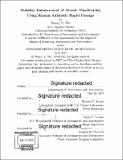Stability enhancement of atomic timekeeping using Raman adiabatic rapid passage
Author(s)
Wu, Nancy Y. (Nancy Yue)
DownloadFull printable version (11.87Mb)
Other Contributors
Massachusetts Institute of Technology. Department of Aeronautics and Astronautics.
Advisor
Richard E. Stoner and Paulo C. Lozano.
Terms of use
Metadata
Show full item recordAbstract
Current state-of-the-art atomic clocks span the range from large accurate fountain clocks such as the NIST-F2 to relatively small inaccurate chip scale clocks. Small clocks with higher accuracy could greatly expand the range of applications for precision timekeeping, and enable cheaper implementation of existing applications. This type of clock may be realized by use of optical Raman interferometry based on pulsed interrogation of cold atoms. However, this method suffers from serious systematic error sources, e.g., AC Stark shift and Zeeman shift, which alter the atomic resonance frequency. A new method based on adiabatic rapid passage (ARP) has been recently demonstrated at Draper which has significantly reduced phase sensitivity to differential AC Stark shift. It is found that compared to standard Raman, use of ARP enhances timekeeping stability by a factor of three with stability of 2 x 10⁻¹² at 100 seconds. Increasing data rate may also improve short term stability. With all of the above improvements, ARP enhances short term fractional stability to 7 x 10⁻¹² at one second.
Description
Thesis: S.M., Massachusetts Institute of Technology, Department of Aeronautics and Astronautics, 2017. Cataloged from PDF version of thesis. Includes bibliographical references (pages 83-85).
Date issued
2017Department
Massachusetts Institute of Technology. Department of Aeronautics and AstronauticsPublisher
Massachusetts Institute of Technology
Keywords
Aeronautics and Astronautics.